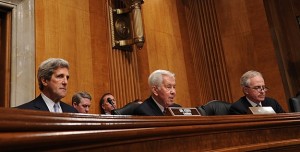Special to WorldTribune.com
WASHINGTON — The U.S. intelligence community has resisted efforts by
Congress to expand intelligence cooperation with Israel.
The Director of National Intelligence lobbied Congress to remove
language from legislation that would expand intelligence and military
cooperation with Israel.

DNI, which represents the 16-member U.S. intelligence community worked with Democrats on the Senate Foreign Relations Committee to remove the words “including satellite intelligence,” from the
U.S.-Israel Enhanced Security Cooperation Act of 2012.
“[It] was simply a matter of clarifying the intelligence aspects of the
bill and being sensitive to the level of specificity in the language,” a DNI spokesman said.
The Washington Free Beacon reported that the attempt to remove
intelligence cooperation from the legislation divided Democrats from
Republicans. The newspaper said the bill that passed the Senate committee was significantly different from the House version.
“U.S. satellite imagery is often used as currency for intelligence
liaisons with Middle East spy agencies, which tend to have better human
sources than the U.S. but less sophisticated technical capabilities,” the
newspaper reported.
Congressional sources said Israel has complained over the lack of
cooperation with the U.S. intelligence community regarding Iran. The sources
said the complaints asserted that Israel was providing far more intelligence
that it received from the United States.
The attempt to delete the intelligence cooperation from the pro-Israeli
bill was defeated on June 19 during a markup session by the Senate Foreign
Relations Committee. At the hearing, a DNI official warned that the bill
could spur demands by other U.S. allies for similar cooperation.
“Nothing nefarious here, just more clear language,” the spokesman said.
The security cooperation bill was meant to promote U.S. security
relations with Israel to counter the threat of a nuclear Iran. The
legislation would require the president to certify that Israel was receiving
advanced weapons, technology and intelligence for its defense.
“A nuclear-weapons capable Iran would fundamentally threaten vital
United States interests, encourage regional nuclear proliferation, further
empower Iran, the world’s leading state sponsor of terror, and pose a
serious and destabilizing threat to Israel and the region,” the legislation,
which passed the House, said.
“The main reason for this bill is that Congress would have oversight
over the U.S. strategic relationship with Israel,” a congressional aide
said.

You must be logged in to post a comment Login